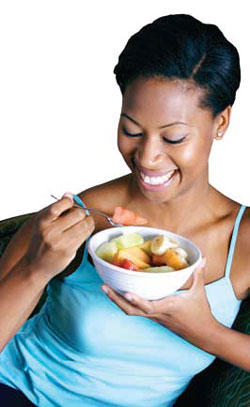
Photo: iStock
Tips for Healthy Eating
To meet your body's needs and help avoid the common discomforts of pregnancy:
- Eat breakfast every day. If you feel sick to your stomach when you first wake up, choose dry whole-wheat or whole-grain toast—even before you get out of bed. Eat the rest of breakfast (fruit, oatmeal, cereal, milk, yogurt, or other foods) later in the morning.
- Eat high-fiber foods. Wholegrain cereals, vegetables, fruits, beans, whole-wheat breads, and brown rice, along with drinking plenty of water and daily physical activity can help prevent the constipation that many women have during pregnancy.
- Keep healthy foods on hand. A bowl of apples, bananas, peaches, oranges, and grapes makes it easy to grab a healthy snack. Fresh, frozen, and canned fruits and vegetables make healthy and quick additions to meals, as do canned beans.
- If you have heartburn during pregnancy, eat small meals more often. Also, eat slowly, avoid spicy and fatty foods (such as hot peppers or fried chicken), drink beverages between instead of with meals, and do not lie down right after eating.
- If you have "morning sickness" (hyperemesis), talk with your health care provider. You may need to adjust the way you eat and drink, such as by eating smaller meals more frequently and drinking plenty of fluids. Your health care provider can help you deal with morning sickness while keeping your healthy eating habits on track.
Certain foods and beverages can harm your baby if you eat or drink them while you are pregnant. Ask your health care provider for a complete list of foods and beverages to avoid. Generally, you should not consume:
- Alcohol. Instead of wine, beer, or liquor, drink apple cider, tomato juice, sparkling water, or other nonalcoholic beverage.
- Fish that may have high levels of mercury (a substance that can build up in fish and harm an unborn baby). Do not eat shark, swordfish, king mackerel, and tilefish during pregnancy. Eat no more than 12 ounces of any fish per week (equal to four 3-ounce servings—each about the size of a deck of cards).
- Soft cheeses such as feta, Brie, and goat cheese and ready-to-eat meats including lunch meats, hot dogs, and deli meats. These foods may contain bacteria called listeria that are harmful to unborn babies. Cooking hot dogs, lunch, and deli meats until steaming hot can kill the bacteria and make these meats safe to eat.
- Raw fish such as sushi, sashimi, or ceviche and raw or undercooked meat and poultry. These foods can contain harmful bacteria. Cook fish, meat, and poultry thoroughly before eating.
- Large amounts of caffeine-containing beverages. If you drink lots of coffee, tea, or soda, check with your health care provider about cutting back on caffeine. Instead, try decaffeinated versions of your favorite beverage, or warm low-fat or fat-free milk, or sparkling mineral water.
- Anything that is not food. Sometimes pregnant women crave something that is not food, such as laundry starch or clay. Talk to your health care provider if you have such a craving.
